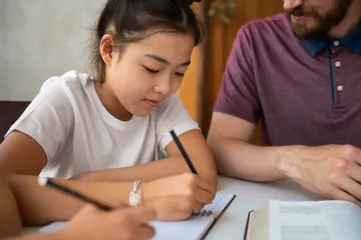Pedagogical Strategies
Pedagogical strategies are evidence-based teaching methods and approaches that enhance learning, engagement, and retention by matching instruction to how brains actually learn.
Why evidence-based strategies work
Pedagogical strategies based on cognitive science produce 200-300 percent better learning outcomes than traditional methods.
Research from cognitive psychology has identified which teaching methods actually create lasting learning versus illusions of knowing. These findings often contradict intuitive approaches, which is why explicit knowledge of pedagogical strategies matters.
You're not alone
If you're frustrated that your teen studies for hours with poor results, or you're unsure how to help with homework beyond "try harder," you need pedagogical strategies. Most parents default to how they were taught, which often wasn't based on learning science. Research shows that common study methods like rereading and highlighting are the least effective approaches.
What it looks like day to day
Student
Your teen reads the same chapter three times but can't answer basic questions about it during the test.
Parent
You try to help with math homework but your explanations seem to confuse more than clarify, leaving everyone frustrated.
Tiny steps to try
- 1
Test before teaching
Have your teen attempt problems before explaining. Productive struggle enhances learning more than immediate instruction.
- 2
Connect to prior knowledge
Link new information to what they already know. "This is like when you learned..."
- 3
Think-pair-share at home
Have your teen explain concepts to you or siblings. Teaching others deepens understanding.
- 4
Worked examples
Walk through solved problems together before attempting new ones. Models provide scaffolding.
- 5
Frequent low-stakes quizzing
Quick verbal quizzes during dinner beat high-pressure test prep. Regular retrieval strengthens memory.
Why pedagogical strategies matter at home
You don't need to be a teacher to use effective teaching strategies. Understanding how learning works helps you support homework and studying.
Effective pedagogical strategies:
• Retrieval practice over rereading
• Spaced repetition instead of cramming
• Elaborative interrogation asking "why"
• Dual coding with words and images
• Interleaving different topics
• Concrete examples before abstract concepts
These strategies work because they align with how memory and understanding actually develop in the brain.
References
Rosenshine, B. (2012). Principles of instruction: Research-based strategies that all teachers should know. American Educator, 36(1), 12-19.
Dunlosky, J., Rawson, K. A., Marsh, E. J., Nathan, M. J., & Willingham, D. T. (2013). Improving students' learning with effective learning techniques. Psychological Science in the Public Interest, 14(1), 4-58.
Ready to help your teen thrive?
Get personalized 1-on-1 coaching to build better habits and boost grades. Join 10,000+ families who trust Coachbit.
Frequently Asked Questions
Why do teachers not use these strategies if they're so effective?
Many teachers weren't trained in cognitive science and rely on traditional methods they experienced as students. Educational systems change slowly. Some teachers do use evidence-based strategies. You can supplement at home regardless of classroom methods. Focus on what you can control.
How do I know which strategy to use when?
Match strategy to goal. For memorization: spaced repetition and retrieval practice. For understanding: elaboration and concrete examples. For skill building: deliberate practice with feedback. For connection: interleaving and comparison. Start with retrieval practice, as it benefits all learning types.
Related Terms
Metacognition
Metacognition is thinking about your thinking - understanding how you learn best, monitoring your comprehension, and adjusting strategies accordingly.
Spaced Repetition
Spaced repetition is reviewing information at increasing intervals to move it from short-term to long-term memory more efficiently than massed practice.
Related Articles

Study Skills for High Schoolers – Mastering Note-Taking
Study strategies are vital to supporting high schoolers in their learning. Organized note-taking can provided a deeper understanding of subject material.
Read article
Metacognition: Reflective Learning Can Help Kids Perform Better
Metacognition is the ability to plan, monitor and evaluate one’s work to improve learning. Kids who reflect on their learning perform better at school.
Read article
